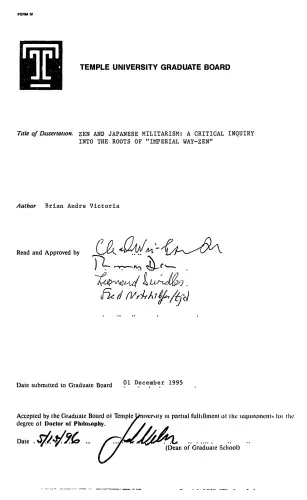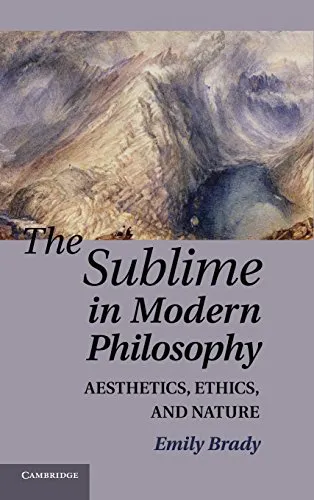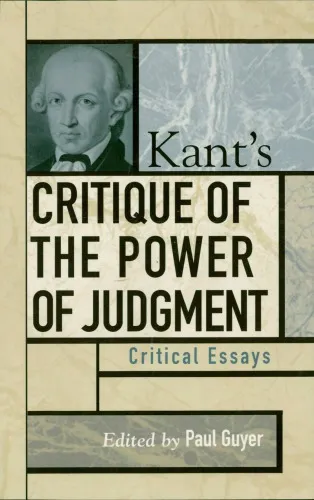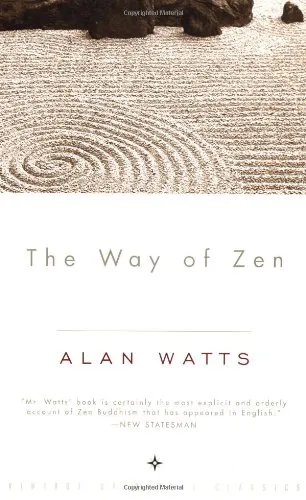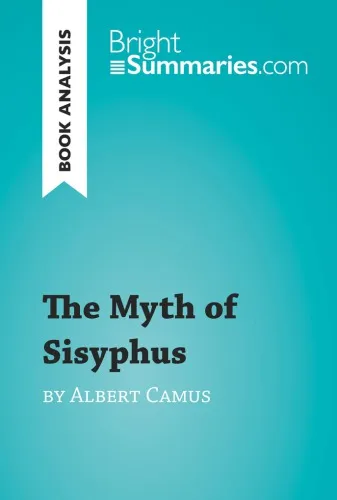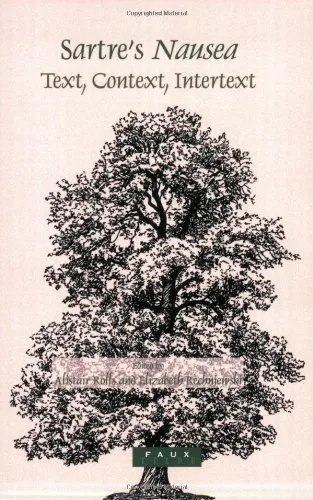Zen and Japanese Militarism: A Critical Inquiry Into the Roots of 'Imperial Way-Zen'
4.3
بر اساس نظر کاربران

شما میتونید سوالاتتون در باره کتاب رو از هوش مصنوعیش بعد از ورود بپرسید
هر دانلود یا پرسش از هوش مصنوعی 2 امتیاز لازم دارد، برای بدست آوردن امتیاز رایگان، به صفحه ی راهنمای امتیازات سر بزنید و یک سری کار ارزشمند انجام بدینکتاب های مرتبط:
معرفی جامع کتاب 'Zen and Japanese Militarism: A Critical Inquiry Into the Roots of "Imperial Way-Zen"' نوشته برایان آندره ویکتوریا
کتاب 'Zen and Japanese Militarism: A Critical Inquiry Into the Roots of "Imperial Way-Zen"' یکی از آثار مهم و پژوهشی در زمینهی نقش Zen در توسعه و تأیید ایدئولوژی نظامیگرایی ژاپن است. این کتاب به تاثیرات فلسفه Zen بر فرهنگ و سیاست دوره امپراتوری ژاپن میپردازد و تلاش میکند تا به جستجوی ریشههای تلفیق Zen با ایدئولوژیهای نظامی بپردازد.
خلاصه کتاب
این کتاب در شش فصل به بررسی روابط و تاثیرات متقابل Zen و نظامیگری ژاپن میپردازد. نویسنده با تحلیل متون تاریخی و فلسفی، به دنبال نشان دادن نقش محوری Zen در شکلگیری و تقویت ایدئولوژی "Imperial Way-Zen" است. این مفهوم به بیان ترکیب مذهبی و نظامی Zen میپردازد که در خدمت اهداف امپراتوری ژاپن، به خصوص در دوران جنگهای مختلف، قرار گرفت. در این اثر، ویکتوریا به بررسی اقوال و نوشتههای رهبران Zen، همانند D.T. Suzuki و استادان دیگر، میپردازد و تاثیرات عمیق آنها را بر ارتش و سیاستگذاران ژاپنی نشان میدهد.
نکات کلیدی
- نقش Zen در گسترش نظامیگری: کتاب تاکید میکند که چگونه Zen به عنوان یک نظام فلسفی میتواند ارزشهای جنگ و اطاعت را تقویت کند.
- تحلیل رهبران Zen: بررسی اعمال و سخنان شخصیتهای برجسته Zen نقش مهمی در درک عمق ارتباط این فلسفه با نظامیگری ایفا میکند.
- تلفیق دین و جنگ: نویسنده توضیح میدهد چگونه عناصر معنوی Zen مورد سوءاستفاده برای اهداف نظامی قرار گرفت.
جملات مشهور از کتاب
"هنگامی که Zen و نظامیگری در ژاپن تلاقی کردند، یک نیروی عمیقاً مخرب شکل گرفت که جهان را به تعجب واداشت."
چرا این کتاب مهم است؟
این کتاب نه تنها به بررسی تاریخ Zen در ژاپن میپردازد، بلکه به تحلیل نقش فرهنگ و فلسفه در شکلگیری سیاستها و ایدئولوژیهای نظامی میپردازد. این اثر بهطور خاص برای محققان، دانشجویان و علاقهمندان به تاریخ ژاپن و فلسفه Zen اهمیت داشته و پرداختن به پیچیدگیهای این روابط درک عمیقتری از آن چه که سبب شکلگیری و تقویت ایدئولوژیهای نظامی شده است فراهم میآورد. همچنین این کتاب یک بررسی انتقادی از تاریخ مذهبی یک ملت ارائه میدهد و به سوالاتی در مورد سوء استفاده از مذهب در امور سیاسی و نظامی پاسخ میدهد.
Introduction
Welcome to an engaging exploration of 'Zen and Japanese Militarism: A Critical Inquiry Into the Roots of "Imperial Way-Zen"'. This book delves deeply into the complex intertwining of Zen Buddhism and Japanese militarism, a topic that has long sparked discussion and controversy among historians, religious scholars, and practitioners of Zen alike.
Detailed Summary of the Book
In this critical exploration, the book investigates the historical period starting from the late 19th century to the end of World War II, a time when Japan's aggressive militarism became tightly interwoven with Zen Buddhism. The text examines how various Zen masters and monks contributed to and justified the military ethos of Imperial Japan, fostering a mindset that revered the sword as much as spiritual enlightenment.
The book scrutinizes the philosophical and ethical underpinnings of the term "Imperial Way-Zen," which sought to harmonize samurai culture and Zen teachings to promote the emperor's cause. By meticulously analyzing historical texts, sermons, and wartime propaganda, the narrative unveils the active role played by some Zen institutions and leaders in endorsing warfare and contributing to the militaristic spirit of the era.
Key Takeaways
- Zen Buddhism was not inherently pacifistic and has a complex history with Japanese militarism.
- Several prominent Zen figures supported Japanese wartime efforts, showing the moral ambiguities within certain teachings.
- Understanding the historical context of Zen's militaristic interpretations can lead to a deeper appreciation of modern pacifist movements within the tradition.
- The book challenges readers to reconsider widely held assumptions about the compatibility of Zen practices with political and military agendas.
Famous Quotes from the Book
"The sword that kills is also the sword that gives life." - A metaphor employed by Zen masters to convey the duality of violence and spiritual enlightenment.
"To die a selfless death in service of the emperor is the highest form of Buddhist practice." - This illustrates how certain teachings were manipulated to validate military loyalty.
Why This Book Matters
This book holds significant importance for multiple reasons. First, it sheds light on a pivotal yet controversial nexus between a renowned spiritual tradition and militaristic fervor, urging contemporary practitioners and scholars to come to terms with the past. It emphasizes the responsibility of religious institutions to uphold ethical integrity, especially in times of nationalistic pressure.
Furthermore, it contributes to broader historical and philosophical discussions about the role of religion in societal and nationalistic conflicts. In an era where militarism and ideological extremism threaten global peace, this analysis prompts a necessary reflection on how spiritual teachings can either be co-opted for violent purposes or serve as a foundation for peace-building efforts.
دانلود رایگان مستقیم
شما میتونید سوالاتتون در باره کتاب رو از هوش مصنوعیش بعد از ورود بپرسید
دسترسی به کتابها از طریق پلتفرمهای قانونی و کتابخانههای عمومی نه تنها از حقوق نویسندگان و ناشران حمایت میکند، بلکه به پایداری فرهنگ کتابخوانی نیز کمک میرساند. پیش از دانلود، لحظهای به بررسی این گزینهها فکر کنید.
این کتاب رو در پلتفرم های دیگه ببینید
WorldCat به شما کمک میکنه تا کتاب ها رو در کتابخانه های سراسر دنیا پیدا کنید
امتیازها، نظرات تخصصی و صحبت ها درباره کتاب را در Goodreads ببینید
کتابهای کمیاب یا دست دوم را در AbeBooks پیدا کنید و بخرید
1474
بازدید4.3
امتیاز0
نظر98%
رضایتنظرات:
4.3
بر اساس 0 نظر کاربران
Questions & Answers
Ask questions about this book or help others by answering
No questions yet. Be the first to ask!
